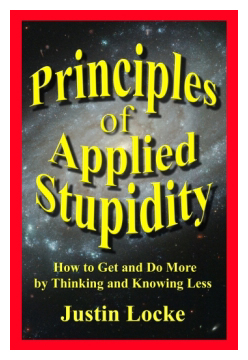When I started writing my second book, “Principles of Applied Stupidity,” I must confess to you, I wasn’t really conscious of what I was trying to do. The things I was discussing in the book were so taboo that I really just saw the subject matter as fodder for humor. All humor is based on some kind of anxiety, and the fear of “looking stupid” is tremendous and universal.
So for this post anyway, let me change the title of the book to “Principles of Applied Vulnerability.” I had to use the word “stupidity” in the title in order to acknowledge the tremendous we fear we have regarding the exposure of our own imperfections.
For those who have not read it, in the book I explain how things normally thought of as “wrong,” “incorrect,” or just very embarrassing, especially in the environment of a classroom, can actually get you a marvelous result. Just a few examples:
Mastery begins with saying “I don’t know.”
The dumber you look, the more stuff people will tell you.
Demonstrations of incompetence inspire greater creativity and confidence in others.
Of course, you can’t use the power of displaying vulnerability if you’re too ashamed of it to let anyone see it to begin with. And we are so proud of ourselves when we come up with ways to conceal it that our egos blind us to the error of our ways.
When we talk about “feeling stupid,” what we really mean is feeling somehow ashamed, embarrassed, inferior, or disapproved of. The word “stupid” is a statement of condemnation. By condemning our own imperfect selves, this is part of the process of numbing up the pain we are feeling. It fixes a state of disconnection, by putting us in a sort of state of connection with the other people that we think are disapproving of us. “Look, I disapprove of myself too, I’m one of the gang.”
One of the greatest benefits I derived from all my “arts education” (that is to say, pushing myself to play an instrument at a professional level) was developing both vocabulary and acceptance regarding my emotional vulnerability. All I learned in public school was how to suppress it. But my greatest power in connecting with customers and my audiences comes directly from my willingness to expose myself to that potential hurt. If I don’t do that, I’m trusting neither myself nor the audience, and when the audience senses that fear and mistrust, they don’t react well.
I don’t want to hit this too hard, but it’s becoming pretty obvious to me that the suppression of vulnerability is done on a fairly broad systematic level. One can make the argument that a certain amount of this is essential in running global civilization, but to me, to suppress this aspect of ourselves (instead of actively accepting it and managing it) is to suppress the meaning and purpose of living. I just can’t agree with it.
(c) Justin Locke

